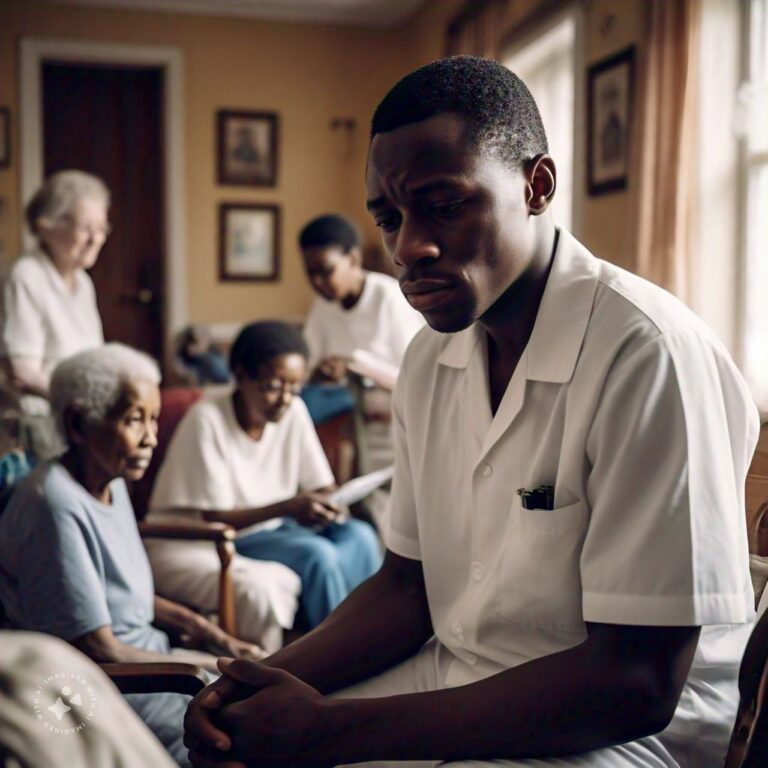
The sun had long set over the care home, but Grace was still on her feet, tending to her elderly residents. It had been an endless shift, filled with cranky demands, restless complaints, and the kind of exhaustion that seeped into her bones.
Mrs Okoye had refused her medication for the third time. Mr Adewale’s temper had flared all day, and nothing seemed right. Grace could feel the pressure building inside her, like a dam about to burst. Finally, when the last resident was settled for the night, she slipped into the small storage room, closed the door, and collapsed.
The tears came in a torrent, releasing all the frustration and fatigue she had been holding back.
She had been strong for so long, and now the cracks were showing. For a moment, she wondered if she could keep going, if she was enough for this endless cycle of care and need.
But then, through the haze of her breakdown, she remembered the small victories: Mrs Okoye’s soft laugh when she finally took her medication; Mr Adewale’s rare smile when she found his missing glasses. Those moments were fleeting, but they were real, and they mattered.
Slowly, Grace wiped her tears, her breathing steadier now. The weight was still there, but she felt a flicker of strength return. She wasn’t just a caregiver; she was a lifeline, and even on the hardest days, that made her effort worth it.
She stood up, shaky but resolute. Tomorrow would be tough again, but she would face it because she knew she could.
Caring for the elderly is incredibly rewarding, but it can also be physically and emotionally exhausting—and that’s perfectly okay. Whether you’re a professional caregiver or a family member, it’s easy to get so caught up in caring for others that you forget to care for yourself.
At @Ìtọ́jú, we make it a priority to support our caregivers because only when they feel healthy and happy can they help others feel the same.
Unfortunately, not all caregivers have access to this support. This article is meant to help those who might be struggling (and of course doesn’t reflect the average experience of caregivers at @Ìtọ́jú). Here are some common emotions you might experience as a caregiver and tips on managing them.
Caregiver Burnout
Caregiver burnout can be identified as a caregiver mentally unplugging from a care recipient, having trouble getting work done, and losing meaning and purpose in the work altogether. Though caregiver burnout isn’t an emotion, it does encompass many of the feelings one experiences in this line of work. You may feel physically and emotionally exhausted, as well as emotionally detached, with a heavy dose of imposter syndrome. Not checking and handling it on time can result in mental and physical repercussions.
How to deal with it: Accept that feeling overwhelmed is okay. You won’t always love your job, and that’s fine. Be kind to yourself, don’t dwell on mistakes, and seek a support group to share your feelings without judgement. Make positive self-care one of your priorities – you can only give the best care when you feel your best.
Anger
Know this with all sincerity: you might lose your marbles at one point or the other. Anger and frustration are common when caring for people who can’t care for themselves, young or old. Anger management is certainly advised, but flaring up once in a while is expected.
How to deal with it: Don’t suppress your anger for long periods. Instead, find healthy outlets for it, like talking to a friend, listening to music, or taking a walk. Reflect deeply on what triggers your anger and the root causes of it. Once you identify and accept these causes, you can begin to work towards a lasting solution and choosing the right outlets. But when you do get angry from time to time, remember to forgive yourself – you’re trying your best.
Anxiety
Sometimes, you may feel like everything is spiralling out of control and can’t deal with it. This will cause anxiety, which then leads to stress, trouble sleeping, fear, and, in extreme cases, panic attacks. Take a breath; it’s just another day at work. However, the feeling of anxiety is valid and nothing to be ashamed of.
How to deal with it: Self-doubt is one of the triggers of anxiety, so try to read a lot of material (books and online) to better equip yourself to care for your senior. In addition, engage in soothing activities or things to distract you from work. Try reading, exercising, or talking through what’s making you anxious with a trusted friend or your employer to help find solutions. If not already offered to you, request regular training/refresher courses with your employer to help you feel more confident about your caregiving abilities. Above all, take deep and slow breaths. You are doing great.
Grief
Grief is common among family caregivers, but professional caregivers can experience it, too. You’re not only experiencing the grief of losing a person, but you may have also shared in the suffering and discomfort of your senior before they passed on. Empathy can be incredibly intense.
How to deal with it: Accept the inevitability of ageing and eventual death—it’s part of life’s cycle. While you can’t change it (and shouldn’t want to), focus on positively impact your senior’s life. Focus on the good times and memories made, and cherish the time they have left. Moreover, consider counselling with a professional or your employer.
Sadness and Depression
Caring for older adults is noble and rewarding, but it comes with its downsides. Constant exposure to loss and change can lead to deep sadness and depression, your mind’s way of trying to shut out painful emotions.
How to deal with it: Your mental health should be taken very seriously. First, take some time to reflect on what might be the root causes and triggers of your sadness and/or depression, and how you might be able to eliminate or deal with them. Consider talking to loved ones, and seeking professional help and support groups to help you do this. Remember that fresh air and exercise will benefit you, so take frequent walks and move your body regularly. Outside work, surround yourself with people and things that bring you joy.
Guilt
Guilt rears its ugly head in various forms. Maybe you had an emotional outburst or felt you were not doing enough for your senior. Guilt is familiar but often looked down upon in the caregiving industry.
How to deal with it: You must slay this emotional dragon with kindness. Be kind and understanding to yourself. There will be difficult days, and you might think negative thoughts, but how you handle those thoughts is what matters. Develop a solutions-orientated mindset, which means that you start focusing less on the problems and more on positive progress.
Remember, there’s only so much one caregiver can do. Therefore, consider ways in which you can receive more support, for example from family and friends, your employer, or other caregivers. Don’t give so much of yourself that there’s nothing left. Your best is enough, and you deserve to enjoy life, too.
Boredom and Resentment
Family caregivers, especially those who aren’t paid, can feel bored and resentful. You may feel like you’re giving up your life for someone else, and the monotony of daily routines can be draining. You may also feel that you have been forced to sacrifice yourself and your dreams, while the rest of the family (such as your siblings) are free to live life as they please.
How to deal with it:
- Don’t shoulder all the responsibility alone.
- Rotate shifts with family members to give everyone a break.
- Be open with your other family members. Don’t be afraid to share your thoughts and feelings with them – your anxieties and frustrations, but also your needs, hopes and aspirations.
- Consider professional help if needed. There’s no shame in recognising your limits and working within them for everyone’s well-being.
Tiredness and Impatience
These two emotions often go hand in hand. On the one hand, you are hardly getting enough sleep because of anxiety or waking up at odd hours at night to assist your senior to the bathroom.
On the other hand, if you are sleep-deprived and arguing with your grandfather or someone else old enough to be him about taking pills that are good for them, your patience may be tested and stretched beyond its limits. You may find yourself snapping or rethinking your choices.
How to deal with it: It’s perfectly normal you are tired and carry over some stress from the day before. You’ll want things to go your way and at your pace.
Try to pick your battles and prioritise getting enough sleep. Some tasks can wait. Consider asking for help or arranging short-term residential care for your senior at a place like @Ìtọ́jú to give yourself a much-needed break. Work with your doctor to create a rest schedule, or enlist a friend or family member to step in when needed.
Conclusion
Stress and frustration are part of the caregiving journey, but managing these emotions is crucial before they affect one’s well-being. One needs to be mentally and physically ready to care for others.
Don’t hesitate to seek help when needed. Remember, you’re doing an incredible job. Keep reminding yourself of that.
At @Ìtọ́jú, we ensure our caregivers are listened to, well cared for, and receive regular training to handle both emotional and physical challenges. We support and appreciate their amazing work, helping them stay confident and well-equipped.
For expert advice and compassionate care, @Ìtọ́jú is here to support you. Reach out to us today.



